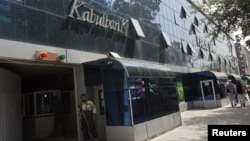The national unity government in Afghanistan, after almost one year in power, has made “notable if incremental and uneven progress” in combating corruption, an Afghan watchdog reported on Thursday.
The Independent Joint Anti-Corruption Monitoring and Evaluation Committee (MEC) cited steps such as the ongoing reforms of the procurement regime and firing of officials accused of corruption.
However, the Kabul-based group, whose guiding committee comprises international experts, says much work remains to be done if Afghanistan is to evolve into a corruption-free country.
The report [PDF] particularly blames authorities in the judicial system for often failing to cooperate with one another, preventing effective investigation of alleged crimes and resulting in cases sometimes getting lost as they are transferred between agencies.
“Unfortunately, notwithstanding billions in foreign investment, the justice sector remains largely incapable of investigating and prosecuting corruption cases, especially against well-connected individuals who operate with near impunity," read an outline of MEC findings.
It also criticized Afghan President Ashraf Ghani and Chief Executive Abdullah Abdullah for failing to fill the crucial position of Attorney General almost twelve months to the day after they were sworn in. “Until this post is filled, the fight against corruption will remain severely handicapped.”
The anti-corruption watchdog says the next twelve months will clarify whether “modest progress is merely ephemeral or the first step on the road to an Afghanistan where corruption is the exception and not the rule.”
Speaking at the report's launch in Kabul, senior MEC member Drago Kos said the Ghani government quickly took some effective actions to tackle corruption, raising hopes and expectations in Afghanistan and abroad.
“But then it slowed down and what we saw and what we feel is that people are more and more surprised, more and more disappointed,” he said.
Afghan officials have not yet commented on the findings.
Bank fraud
President Ghani has called for Afghans to wage a jihad or holy war against corruption.
He told a meeting of foreign donors earlier this month that his government, since taking office last September, has taken steps to end the culture of impunity by prosecuting people who steal from the government regardless of their political connections.
The Afghan president cited his own efforts to investigate and prosecute those responsible for the 2010 collapse of Kabul Bank. Among the world’ biggest banking frauds, it triggered a domestic financial crisis.
Ghani reopened the inquiry into the theft of almost $1 billion from the bank just days after assuming office to honor a key campaign promise to fight corruption.
Afghan officials claim to have since recovered nearly half of the missing amount, but the banking sector has yet to fully recover.
Ghani asserted that Kabul Bank is no longer “a symbol of impotence, but a symbol of resolve.”
He also mentioned weekly meetings of the National Procurement Commission that he co-chairs with Abdullah. The group reviews all high-value contracts that have cost the government “hundreds of millions of dollars in inefficient and faulty specifications.”
The anti-corruption efforts, he said, have led to an almost instantaneous increase in revenue collection.
But MEC's Kos says Afghans will start seeing results of official anti-corruption efforts only when the government takes the lead.
“The president has called for jihad against corruption. Yes, this country needs jihad against corruption, but the government will have to take the lead on it," Kos said. "If this will not happen, citizens and international community will not have anybody to join in fighting corruption.”
He added that Afghanistan’s donors will re-assess Kabul’s anti-corruption efforts next year to decide whether, and to which extent, they will continue their financial support.




